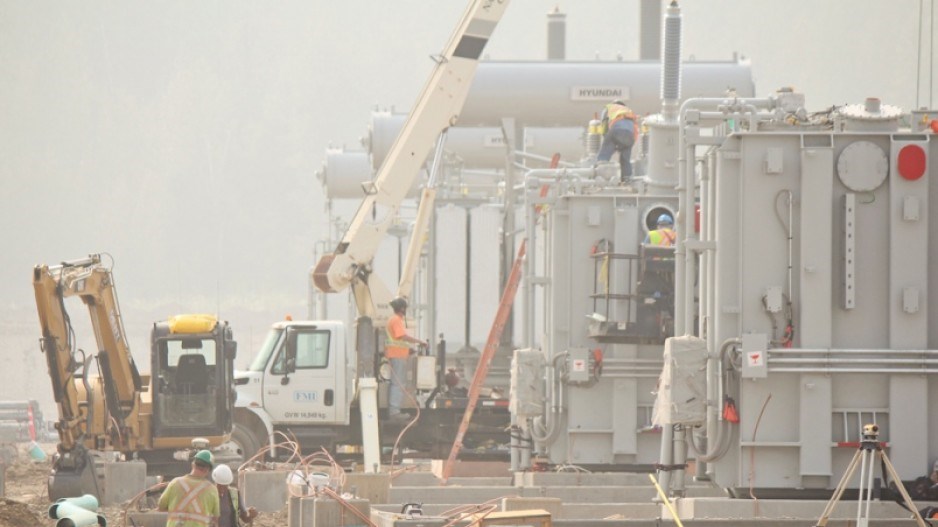The public version of a former deputy minister’s October 2020 report to cabinet, which prompted the NDP government to keep building Site C, did not contain a subtle caution about a major contractor.
The NDP government released the 46-page public version last Feb. 26 when Premier John Horgan revealed the megaproject’s cost had ballooned to $16 billion and wouldn’t be finished until 2025.
BC Hydro and the NDP government are withholding the full report because they say it was created for cabinet and contains a contractor’s proprietary information.
The heavily censored, 113-page version, marked “privileged and confidential,” contained a final paragraph not released in the public version. Under the heading Additional Considerations for Provincial Government, author Peter Milburn – special adviser to government – made a brief mention about Acciona, the Spanish construction giant that leads Site C's $1.75 billion main civil works contract.
“As noted above, [Peace River Hydro Partners] is currently comprised of Acciona and Samsung. Acciona has been active in the B.C. marketplace and been awarded a number of large construction contracts, including the Pattullo Bridge Replacement Bridge Project, the Broadway Subway Line, and the North Shore Wastewater Treatment Plant,” said the report, obtained via freedom of information.
“Samsung has not been as active in the local market. The agencies and governmental organizations that own or manage these projects, including BC Hydro and the Transportation Investment Corporation, should consult with each other, and share lessons learned in order to develop strategies for a better partnership with Acciona.”
Since Milburn’s $500,000 report, the $1.377 billion new Pattullo Bridge opening was delayed to 2024, the completion of the $2.83 billion Broadway Subway was delayed to 2026 and Metro Vancouver replaced Acciona with PCL on the North Shore Wastewater Treatment Plant. The North Vancouver project is costing double the original estimate at more than $1 billion and is expected to be finished in 2025. Metro Vancouver and Acciona are suing each other in BC Supreme Court.
Milburn’s summary mentioned how BC Hydro came close to firing Ernst and Young [EY] after a 2018 report. But the version for cabinet goes into greater detail, plus appendices.
EY created a report called Site C: Project Control and Risk Workstream Plan and Approach, but it was not well received and marked the beginning of a strained relationship.
BC Hydro responded with a June 2018 letter disagreeing with EY’s conclusions and put EY on notice of termination in September 2018.
“BC Hydro officials made the case that the primary reason for the tension was cost, as they were not getting value for the money spent,” said Milburn’s report.
BC Hydro statements of financial information show it paid EY $306,822 in the fiscal year ended March 31, 2018 and $4,360,202 for 2019. Payments for the following three years averaged $1.725 million.
EY denied it was overbilling BC Hydro and asked to be allowed to observe key contractor progress meetings about the main civil works, generating station and spillways, and balance of plant. However, that was not included in the reduced statement of work signed in January 2019.
BC Hydro CEO Chris O’Riley’s June 1, 2018 letter to the Project Assurance Board criticized EY for focusing on the troubled main civil works contract, using criteria about project risks biased against project manager accountability, and for many “irreconcilable differences” with a 2016 report.
The relationship with Peace River Hydro Partners has been bumpy. Ex-partner Petrowest went into receivership in 2017 and the remaining duo has grappled with geotechnical, contract management and procurement challenges, along with the pandemic. Acciona and Samsung face a July 1, 2023 deadline to complete the main dam work, fill the reservoir and commission powerhouse units.
“BC Hydro has rarely managed a civil contract of this size and has not completed one for many years,” Milburn remarked.
O'Riley conceded it was a “challenge for the project” to be without a contractual schedule after missing the 2019 river diversion window. He claimed BC Hydro had been transparent about the situation and was working toward a settlement with PRHP.
“It is inappropriate and unfair to assess our broader capabilities using this particular contract at a time when it has been severely compromised,” O’Riley wrote.
In 2016, EY said BC Hydro’s risk management process was both robust and fulsome, and following industry best practices. But, in the 2018 report, EY said that “current practice does not reflect what would normally be expected on a project of this scale.”
The 2016 report rated BC Hydro a three or four out of five on a maturity scale. In the 2018 version, BC Hydro merited only a basic or developing rating in every category, worth one or two points on the scale.
In 2016, BC Hydro was a three overall on project governance as an approval mechanisms, with four or five scores on every subcomponent. By contrast, the 2018 report gave BC Hydro a basic score of one for governance: fact-based decision making.
“I find it difficult to reconcile two opposing views of the project from the same consultancy,” O’Riley wrote. “While the project has experienced challenges with budget and schedule, these did not result from failures of risk management and control.”




